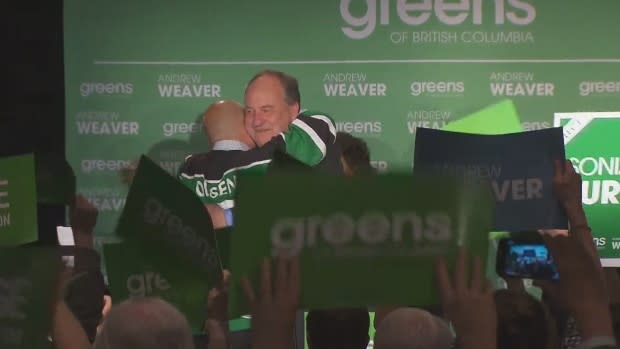'We need to break out': Potential Green party leadership candidate says Metro Vancouver key to future
Three months after Andrew Weaver announced he would be stepping down as leader of the B.C. Green Party, a grand total of zero candidates have put their name forward to replace him.
But that will likely soon change.
"I'm going to make an announcement, but I'm not making any announcements [just] yet," said Jonina Campbell, the party's deputy leader and former New Westminster school board trustee.
Campbell, who said she would clarify her leadership intentions by the end of the month, ran for the party in New Westminster during the last provincial election and finished second with 25 per cent of the vote.
That might not sound like much, but it was the party's best result in Metro Vancouver.
It's a big reason why Campbell wants the Greens to prioritize Lower Mainland issues as the party attempts to build on the three seats it won in the last election — all of which are on Vancouver Island.
"We need to break out," she said.
"There's a lot of alignment with who we are and the ... values of Metro Vancouver. I think the real challenge for us though is getting out there and connecting."
Candidate recruitment, infrastructure building
Greens in Vancouver agree that "getting out there and connecting" has been the provincial party's biggest impediment to success in the region.
"The Green Party [in] B.C. has to actually put boots on the ground and get active now," said Vancouver Councillor Adriane Carr, herself a former leader of the party.
"It's outreach, it's actually putting on events, being at street festivals like the Car Free Days ... it's maintaining lists of people who have interest in certain subjects and putting on community events."
Vancouver Councillor Pete Fry ran for the B.C. Green Party in a 2016 byelection and received 27 per cent of the vote — the party's best ever result in Metro Vancouver.
"We kind of, in many respects ran our own campaigns almost independent of the party. There wasn't a lot of local party infrastructure," he said.
Fry added the party has improved its infrastructure since then, but still needs to do more to give candidates a competitive chance in places where it's made less inroads.
"They have to find candidates, or nurture candidates who have strong community profiles, and who have been out there really hustling in the community," he said.
"A simple fact of the matter is we haven't had a lot of candidate nurturing."

Reaching out to diverse communities
Fry and Carr said the party could compete in Metro Vancouver on a policy level and has the potential to pick up some of the region's 43 seats.
But they both agree that the party also needs to do a better job reaching out to diverse communities; in the 2017 election it nominated fewer women than the NDP or Liberals, and just five of its 83 candidates were people of colour.
"We recognize it was a problem," said Campbell.
"I've personally attended a lot of events ... but we really need to be going out and connecting and building those relationships."
The party will select a new leader in June — but Campbell is optimistic that whether she runs or not, the party's best Metro Vancouver result in the next election will be a lot better than how she fared in 2017.
"We're facing the housing crisis, the opioid crisis, the issues around transportation and people demanding action on climate and living sustainably," she said.
"There's a really good fit between the issues that Vancouverites really care about and the B.C. Green values."

